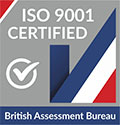The U.S. Government updated their Central Command (CENTCOM) screening standards from MOD 12 to MOD 13 in 2017. While many of the standards from MOD 12 remain the same, there are a variety of additional guidelines, clarifications, and new requirements for personnel who must meet these standards prior to deployment.
Does your workforce need to meet MOD 13 standards? We can help!
The Remote Medical International medical screening team has years of experience coordinating MOD 12 screenings, and immediately dove into learning the new intricacies of MOD 13 when the update was released. After eight months of coordinating MOD 13 screenings, we gathered our expertise below for you and your team.
WHAT IS MOD 13?
MOD 13 is a set of physical and psychological standards put forward by the United States Central Command, and applies to all U.S. uniformed service members, government civilian employees, U.S. Department of Defense (DoD) contractor employees, and volunteers deploying to CENTCOM’s area of responsibility. CENTCOM’s area of responsibility includes countries in the Middle East, Central Asia, and parts of Northern Africa, where Iraq and Afghanistan are currently the most significant.
It’s important to note that the fitness service standards of a uniformed service member’s branch are more stringent and supersede the MOD 13 standard. This means a uniformed service member can meet the MOD 13 standards and still fail their branch’s fitness standards and is therefore non-deployable.
WHY IS MOD 13 REQUIRED?
Deployed environments can be extremely demanding, both physically and psychologically. In addition to the stresses of a deployed individual’s job responsibilities, extreme temperatures, limited dietary options, sleep deprivation and disruption, poor air quality, and emotional stress are all common. All of these factors can make many medical conditions worse.
Additionally, many chronic conditions that require ongoing care or major medical procedures, like cardiovascular, respiratory, orthopedic, and psychological conditions, can be extremely difficult or even impossible to treat in a deployed environment. Field hospitals often don’t have the necessary equipment to treat these conditions, and many medicines are impossible to get overseas.
MOD 13 accounts for these challenges by ensuring all deployed CENTCOM personnel meet a minimum standard of fitness. CENTCOM’s area of responsibility, without a proper waiver, considers personnel with conditions like those listed above non-deployable—and even if a waiver application is submitted, it may not be granted.
When submitting a waiver application, CENTCOM favors those that are submitted by medical authorities like a doctor, over those that are just submitted by the individual. If a uniformed service member requests a waiver, it must also include a command endorsement of the application.
CHANGES FROM MOD 12
MOD 13 builds upon the foundation of MOD 12, but focuses more on preventative measures. It also clarifies many conditions required to approve a waiver for deployment, and takes the specific health concerns of transgender individuals into account.
The original CENTCOM standards primarily emphasized general medicine, with little on preventative measures. As resources and conditions for medical evacuations in the field decrease, and field hospitals have limited medical equipment assets, detecting and preventing medical and psychological issues before deployment is of key importance.
Longer Stability Timeframe
Previous MOD standards required a 60-day timeframe before deployment to determine stability and assess the need for further care for newly diagnosed medical and psychological conditions or newly prescribed medications. MOD 13 now requires a 90-day window with no issues for most conditions.
Newly Included Medical Conditions
A number of medical conditions require a waiver for deployment for the first time under MOD 13. These include:
- Endocrine conditions: Any endocrine conditions that require replacement or adjustment therapies must be stable, and cannot require any laboratory monitoring or specialty consultation. These conditions can require routine follow-up, but it must be available in the deployed location or by special arrangement. Only oral or transdermal hormonal preparations are allowed, and must be within clinically appropriate dose parameters, have no special storage requirements, and no side effects that interfere with the deployed individual’s job duties.
- Migraine headaches: Frequent or severe migraine headaches that disrupt normal job duties require a waiver that includes history, frequency, severity, and functional impact of the headaches. Previous and current treatment documentation is also required.
Body Mass Index (BMI) Cutoff
MOD 13 includes more stringent BMI guidelines. While MOD 12 required a waiver for any individual with both BMI greater than 35 and serious chronic diseases like diabetes, cardiovascular disease, or hypertension, MOD 13 requires a waiver simply for BMI greater than 35, whether or not a significant comorbidity is present.
The regulation that individuals with morbid obesity—BMI greater than 40 or weight over 300 pounds—cannot be deployed is carried over from MOD 12. Uniformed service personnel that are in compliance with their branch’s body fat guidelines do not require a waiver.
New Surgery Considerations
One new surgery condition requires a waiver under MOD 13. Cosmetic, bariatric, and gender reassignment procedures are now considered disqualifying until fully recovered with all follow-up and revisions complete. This includes adjuvant counselling, medical treatment, and uniformed services requirements.
Additionally, special dietary and hygienic requirements as a result of surgery can be independently disqualifying if they cannot be reliably accommodated in the deployed environment.
Additional Psychiatric Conditions and Guidelines
One of the biggest changes from MOD 12 to MOD 13 is the expanded psychiatric conditions and guidelines. MOD 13 requires diagnostic criteria and treatment plans to follow the Diagnostic and Statistical Manual of Mental Disorders, Fourth or Fifth edition, and current standards of care. CENTCOM requires waivers to include information on the applicant’s condition, including history and baselines symptoms of known disorders, severity of symptoms with and without treatment, and likelihood to recur or deteriorate in a deployed environment.
Some additional changes to the psychiatric section include:
- Psychotic and bipolar-spectrum disorders are now strictly disqualifying; they required a waiver under MOD 12.
- Any behavioral health condition that requires periodic—defined as beyond quarterly—counselling or therapy requires a waiver.
- Anxiety disorders requiring the use of benzodiazepines for management, or featuring symptoms of panic or phobia, require a waiver.
- Post-traumatic stress disorder (PTSD) is called out specifically, and requires a waiver when not completely treated or when therapy includes the use of benzodiazepines without an additional anxiety diagnosis. CENTCOM requires waivers for PTSD to include if the condition is combat-related, and if so, comment on the impact that returning to a deployed environment could have on the applicant’s well-being and job performance.
- Gender dysphoria is not inherently disqualifying, but becomes so for those actively undergoing gender transition until the process, including all necessary follow-up and stabilization, is complete.
- A waiver is required for bulimia and anorexia nervosa.
- Attention deficit disorder and attention deficit hyperactivity disorder require a waiver, especially if Class II stimulants are used for treatment. Clinical features and objective testing results must be included in the waiver application for stimulant use, as well as clinically appropriate and justified dosages.
- Enrollment in a substance abuse program rolls over from MOD 12, but now a post-treatment period of demonstrated stability is required. The length of this period depends on individual patient factors.
- MOD 13 includes expanded guidelines for psychiatric disorders that are diagnosed during deployment. Diagnoses with bipolar, psychotic, or suicidal features must be redeployed at the soonest opportunity via medical evacuation. Diagnoses requiring the prescription of scheduled controlled substances under the Controlled Substance Act require an approved waiver to obtain routine refills of the medication.
Expansion of Medications
Some additional guidelines have been added to the medications section of MOD 13 that clarify the list of medications that are disqualifying for deployment without a waiver. Any medication that if lost, misplaced, stolen, or destroyed and would result in significant worsening or grave outcome for the affected individual before the medication can be reasonably replaced is considered disqualifying without a waiver, even if the medication itself is not strictly prohibited.
On top of that, any medication that requires periodic laboratory monitoring, titrated dosing, or special handling or storage requirements is disqualifying. Also, medication that has documented side effects when used alone or in combination with other required therapy that are significantly impairing or impose an undue risk to the individual, or operational objectives, is disqualified.
A variety of new medications require a waiver under MOD 13, including:
- Antiretrovirals used for pre-exposure prophylaxis
- Narcotics/narcotic combinations such as oxycodone and hydrocodone
- Cannabinoids (Possession or use may be a criminal offense in the CENTCOM AOR)
- Anorexiants
- Androgens and anabolic steroids
- Botulinum toxin (botox) for current or recent use to control severe pain
- Antipsychotics are clarified to include: Haloperidol (Haldol), fluphenazine (Prolixin), quetiapine (Seroquel), aripiprazole (Abilify), etc.
- Divalproex and lamotrigine (Lamictal) have been added to the list of anticonvulsants
Epinephrine (Epipens) no longer require a waiver, although a waiver for underlying allergies may be required. New language has been added that allows single pill-count issuances of sedative hypnotics/amnestics for operational transition without a waiver.
About Remote Medical International
If your employees are required to comply with MOD 13 screening standards, Remote Medical International can help. With experience scheduling screenings in over 650 cities and coordinating home of record and on-site exams, we have expertise you can trust. Contact us today to learn more about our medical screening services.
Sources
https://www.express-scripts.com/TRICARE/tools/USCENTCOM-MOD-13_TAB-A.pdf



